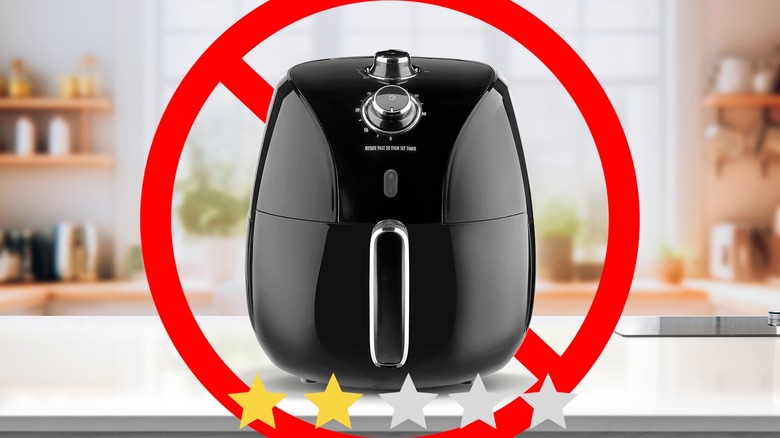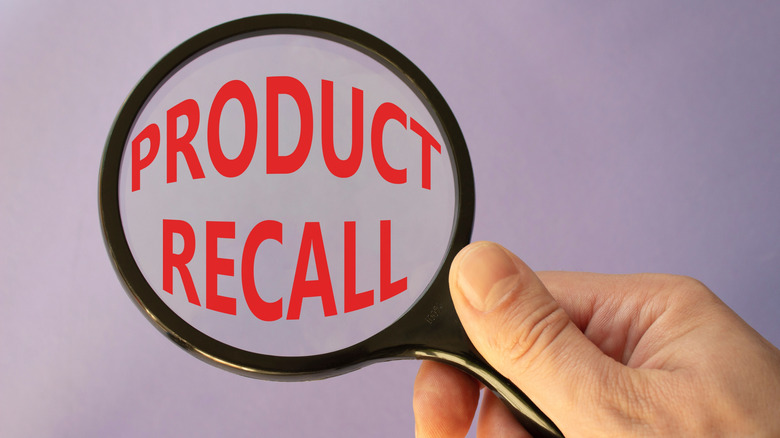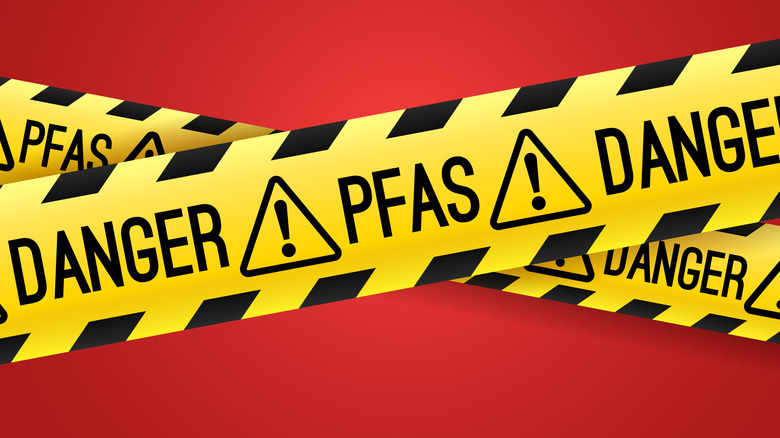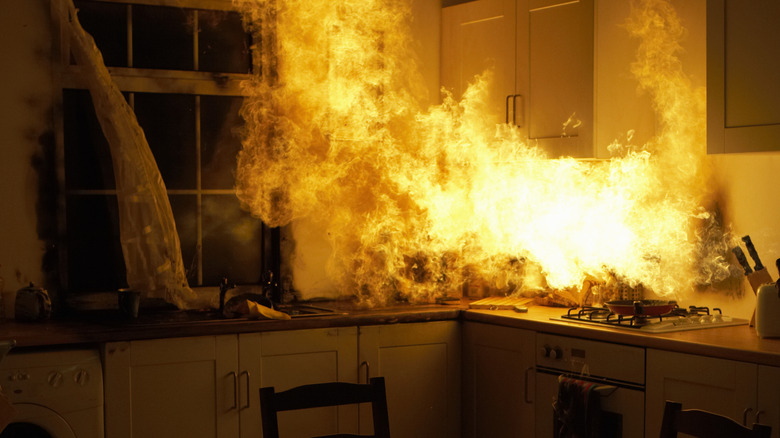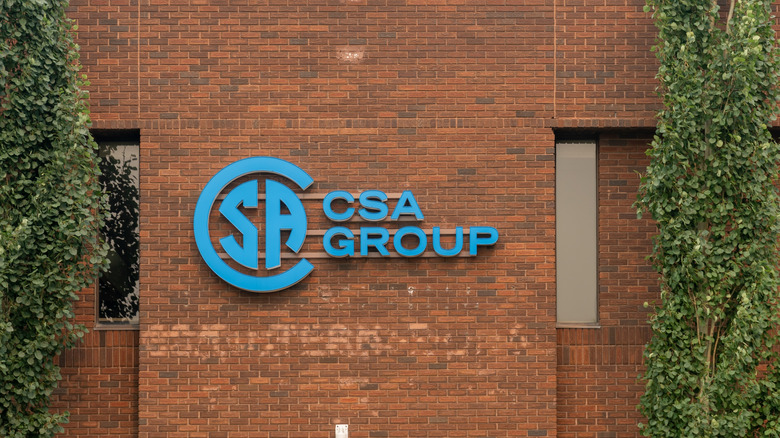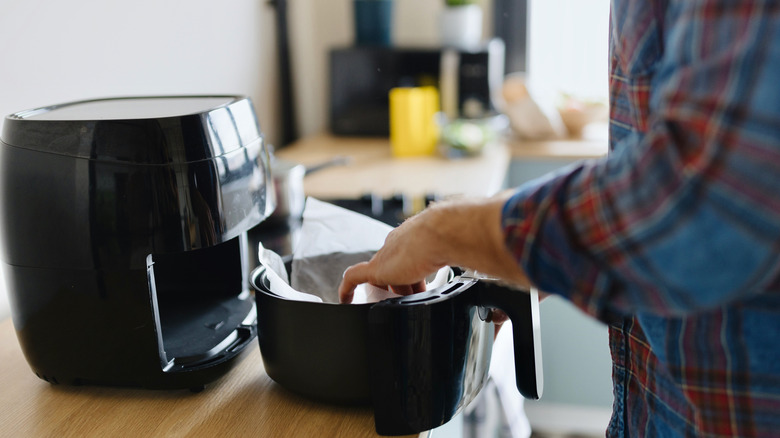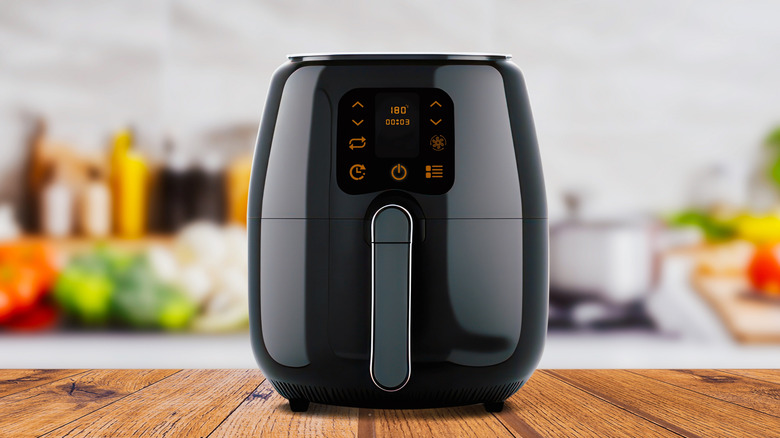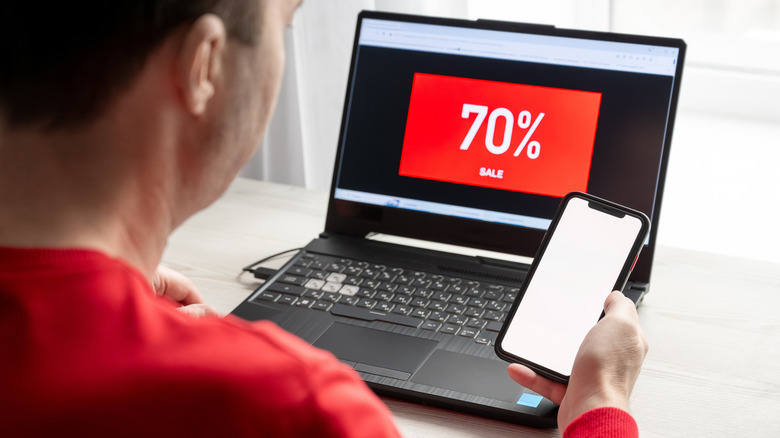8 Signs The Cheap Air Fryer You're Thinking Of Buying May Be Unsafe
Air fryers are an amazing tool for easy baking that can go a long way toward making mealtime quick and healthy. However, they can also be pricey. Most standard models are at least $50 if they're not on sale, with $60 or $70 being the norm. Air fryer ovens, meanwhile, usually start at $60 or $70 but can cost upward of $200 depending on the size and brand.
As a result, it's totally understandable that many people look for cheaper options. Sometimes that means waiting for good sales, but it can also be achieved by purchasing secondhand or looking at low-cost international sellers. Unfortunately, sometimes cheap air fryers simply aren't safe.
A questionable appliance can overheat or start a fire, leading to injuries like burns or cuts. It can also cause longer-term health issues, like cancer. While there's nothing inherently wrong with looking for a low-cost air fryer, it's extremely important to be sure that the one you plan to buy is safe for you and your family. To determine this, there are a few things you can look for to tell if that cheap air fryer might be a risky choice.
1. A recall has been issued
When most people think of recalls, they often think of big food recalls, or maybe even car parts that had to be recalled. As it turns out, items like appliances and electronics get recalled all the time. This is usually because there is a defect or design flaw that makes the product dangerous to use.
Since 2022, over 3 million air fryers have been recalled. These aren't products from cheap, low-quality brands either; many well-known companies have had to pull their air fryers from the shelves. In October 2022, the Consumer Product Safety Commission (CPSC) recalled Magic Chef Air Fryers for overheating. In February 2023, four different models of Cosori air fryers were recalled due to a faulty wiring connection that caused them to overheat, resulting in burns. In September of that year, a wiring issue in Secura air fryers resulted in a recall, and just a few months later, Empower air fryers were recalled due to an internal piece that frequently broke. Most recently, in March of 2024, Best Buy recalled Insignia air fryers and air fryer ovens due to overheating.
Recalled air fryers should no longer be on store shelves, but you may encounter them if you're buying secondhand, through resellers, or are looking at less-reputable selling sites. If you're not sure if you're looking at a recalled product, check out the CPSC website, where you can find a full list of recalled items.
2. The reviews seem suspicious
Reading reviews can be a great method for deciding if a product is worthwhile or not, but it's not foolproof. Unhappy customers are more likely to leave reviews than happy ones, and it's not uncommon for companies to fake positive reviews. In fact, sellers on sites like Amazon might post one product, gain positive reviews, and then switch the product in the listing for a lower-quality one, tricking users into thinking that product has better reviews than it really does.
With all these sketchy business practices, it can be hard to figure out if a product is actually good before you buy it. If reviews are overwhelmingly negative, there's usually a reason, but check to ensure they look legitimate and aren't just from one angry customer or a competitor.
To tell if positive reviews are real, cross-reference opinions across websites. If the reviews on Target, Amazon, and Best Buy are all positive, it's probably a legit product. Watch for cookie-cutter, generic reviews, as these can be made by bots. Additionally, look for reviews with pictures. This helps ensure that the reviews are real, and also helps you avoid the nasty bait-and-switch practice from shady online sellers.
3. It contains harmful chemicals
Unfortunately, products that we use every day have often been made with harmful chemicals and substances that can have a huge impact on health. Paint and gasoline were made with lead, tampons have arsenic, and many kitchen tools and appliances contain forever chemicals. Forever chemicals like per- and polyfluoroalkyl substances (PFAS) don't break down in the environment or the human body, so they essentially remain on the planet forever.
PFAS mainly entered the market through nonstick cookware, but they aren't the only dangerous substances you can find in your appliances. Perfluorooctanoic acid (PFOA) is another forever chemical used for nonstick surfaces. Bisphenol A (BPA), while not technically a forever chemical, can lead to severe health effects and has been used in a variety of ways.
Now the good news is that products in the U.S. are not allowed to contain any levels of leachable lead. Additionally, several states have banned forever chemicals and BPAs. As a result, many companies no longer use these materials in their products, and often indicate as such on the packaging. However, if you're purchasing through a site like Temu, Mercari, or AliExpress, where items are usually shipped from other countries, there is no guarantee that your item will be free from lead and forever chemicals.
4. Ventilation is obstructed
If you look at the reasons most air fryers have been recalled, it's typically due to overheating. This can be extremely dangerous — when the recalled Insignia air fryers overheated, the handles melted or broke, increasing the likelihood of burns and fire. When air fryer ovens overheated, the glass typically shattered, which posed a risk of laceration, in addition to possibly causing a fire and burns.
Overheating can happen due to a wiring issue, like with the Cosori air fryers, but it can also happen when there isn't proper ventilation. Air fryers make food crispy by circulating hot air around it, hitting every surface. In order to do this, the appliance needs to be able to draw air in as well as vent the hot air out so that the unit doesn't overheat. If anything obstructs the ventilation of an air fryer, the fryer could overheat, resulting in injuries or even fire.
In general, air fryers are designed with ventilation in mind. However, as the recalls show, these units can still overheat. Before buying anything from a reseller or second-hand, check the recall list. Additionally, take a good look at the air fryer to ensure the vents are clear and located in a place where they can push air out. For example, if the vents are on the bottom of the unit, you won't get proper ventilation. Finally, place your air fryer in a spot where it will get adequate air flow when in use.
5. It doesn't have safety certification
In the United States, electrical equipment, including appliances, needs to be certified by a Nationally Recognized Testing Laboratory (NRTL). These labs then assess whether the product meets the National Electrical Code (NEC) for that type of product.
The Occupational Safety and Health Administration (OSHA) is the governing body that determines which labs qualify to be NRTLs. There are over 20 NRTLs in the U.S., and some of the more commonly known ones include the CSA group, Intertek's Electrical Testing Laboratories (ETL), NSF International, and Underwriter's Laboratories (UL).
Unfortunately, information on NRTL certification can be kind of tricky to find, as certification isn't always listed on online product pages. If you're shopping in-store, you can usually find the NRTL insignia on the package, often on the back or bottom. For example, Intertek's certification symbol is the letters ETL in a circle with the word "Intertek" underneath it. Underwriter's Laboratories has the letters UL in a red circle with the word "solutions" to the right.
Luckily, if you're purchasing a product sold from a well-known brand through big box stores in the U.S., it's going to be certified. On the other hand, if you're purchasing online from sites that sell products from all over the world, you're going to have to do some digging.
6. Cleaning is difficult
Part of air fryer ownership is cleaning your air fryer. Staying on top of this task helps extend the appliance's life — stuck-on food or leftover grease can damage the unit, causing it to overheat and smoke, and possibly even causing a fire. The other reason it's important to be vigilant about cleaning your air fryer is for your health.
First, food products left in your air fryer can develop bacteria and mold, which can give you food poisoning. The other concern is due to acrylamide, which is a possible human carcinogen. When food is heated above 250 F, a chemical reaction causes the release of acrylamide. High-carb foods like french fries release more acrylamide. In general, a small amount is safe, but if you've got burnt-on food smoldering at the bottom of your air fryer, you're increasing your exposure.
To combat potential issues, you want an air fryer that's easy to clean. At a minimum, the basket should be removable, although it's best if the grease tray is as well. Most product listings will tell you if parts are removable for washing, and you can also read reviews to find out how easy the product is to clean.
7. You've never heard of the brand
Even if you've never looked into air fryers much, there are a few brands you've probably heard of, like Ninja and Cuisinart. When shopping for air fryers, you'll likely come across many of the same brands, like Black+Decker, Gourmia, and Hamilton Beach. But if you're searching on a site that isn't based in the U.S., you might find brands that you're not going to see in a Target or Walmart. That's when you need to be on high alert.
While you don't have to buy something name brand or top-of-the-line, you should still buy a product from a recognizable company. The type of brands sold in stores will have air fryers that are NRTL-certified, so you know they meet safety standards. Additionally, these brands usually have customer service centers that are easier to access than those from foreign companies.
That doesn't mean that foreign brands are necessarily bad, it just means if you come across a name you've never heard of before and can't find it at stores in the U.S., you're going to have to do your due diligence. Read product reviews and try to find out what you can about that country's safety certification and whether or not that product is certified.
8. The deal seems too good to be true
If something seems too good to be true, it probably is. This is definitely true when it comes to purchasing electronics or appliances. While it's possible to get really good deals sometimes, prices that are slashed too far should give you pause. Again, you're generally safe buying from a store like Target or Walmart, as these products will be NRTL-certified and these chains are required to remove recalled items from shelves.
Sites like Temu and AliExpress often have amazing deals, but they come at a cost. It's not unusual to find toxic substances like lead in products from these sellers. If you find an air fryer on these sites for less than the price of a Costco hot dog, that's a major red flag. Again, do your research by looking at reviews, product specifications, certifications, and checking recall lists to see if the product is included. The savings you get on these sites aren't worth the hospital bills you'll get later from burns or health issues.
The same is true when you're purchasing items second-hand or from a reseller. Look for evidence of certification and check to see that the product hasn't been recalled. There are plenty of valid reasons that someone may be trying to quickly offload an air fryer, but there are also some less savory ones as well. Checking that the air fryer you're buying is safe can go a long way in keeping you and your family safe.
